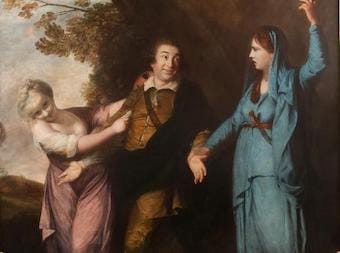1027
Poet Percy Bysshe Shelley says that the pinnacle of political achievement is the government not of others, but of ourselves.
Percy Shelley’s sonnet ‘Political Greatness’ was published after his death by his widow, Mary. Shelley rejected any theory of social order based on coercion, whether by explicit legislation or by the tyranny of unbreakable custom. Humanity will never be served by mastering others; it is mastering yourself that is the true humanism.
Picture: By Sir Joshua Reynolds (1723-1792), via Wikimedia Commons. Licence: Public domain. Source.
Posted October 12 2017
1028
Poet John Keats speaks of the beauties of Autumn, her colours, her sounds and her rich harvest.
On a walk beside the River Itchen near Winchester, on 19th September 1819, the young poet John Keats was deeply moved by the sights and sounds of autumn. His lyric poem ‘To Autumn’ is widely regarded as one of the most perfectly formed poems in the English language.
Picture: © David Crocker, Geograph. Licence: CC-BY-SA 2.0.. Source.
Posted October 12 2017
1029
Elizabethan courtier and soldier Sir Philip Sidney shows that a nobleman can also be a gentleman.
Writer and courtier Sir Philip Sidney died on October 17th, 1586, from a wound he had suffered while fighting in support of Dutch independence from Spain at the Battle of Zutphen on September 22nd. He was just 31. The account below is by Philip’s devoted friend Fulke Greville, who served James I as Chancellor of the Exchequer.
Picture: © Gouwenaar, Wikimedia Commons. Licence: Creative Commons CC0 1.0 Universal Public Domain Dedication.. Source.
Posted October 5 2017
1030
One week into a Lenten retreat with the Bishop of Hexham, a boy’s miserable life is turned right around.
Bishop John of Hexham (?-721) is better known today as St John of Beverley, as he had been Abbot of the monastery in Beverley, North Yorkshire, before being elevated to the See of Hexham. His contemporary Bede was a great admirer, and told this story of him.
Picture: © David Dixon, Geograph. Licence: CC BY-SA 2.0.. Source.
Posted October 4 2017
1031
A celebration of St Michael, captain of heaven’s angel host, courteous warrior, and healer.
St Michael is the supreme general of all the angels of God, a figure attested in the Book of Daniel, the Epistle of Jude, and the Revelation of St John the Divine, as well as in Rabbinic literature. In the time of St Bede, as still today in the Eastern Churches, he was associated with healing and a safe passage to heaven.
Picture: © José Luiz Bernardes Ribeiro, Wikimedia Commons. Licence: CC BY-SA 3.0.. Source.
Posted October 2 2017
1032
A faithful but unprepossessing pet is turned out of hearth and home.
This Russian folktale is a story about a tom cat who is abandoned by his fastidious owner, but shows all the philosophical resilience of cats, and reinvents himself as Cat Ivanovitch, Head Forester of all the animals of the wood. But he could not have done it without the help of a little vixen called Lisabeta, and a good deal of luck.
Picture: © Roswitha Budde, Cattery vom Hohen Timp, via Wikimedia Commons. Licence: CC BY-SA 3.0.. Source.
Posted September 30 2017





